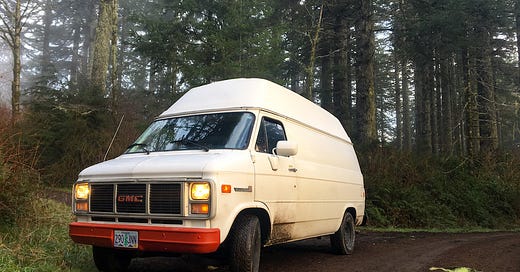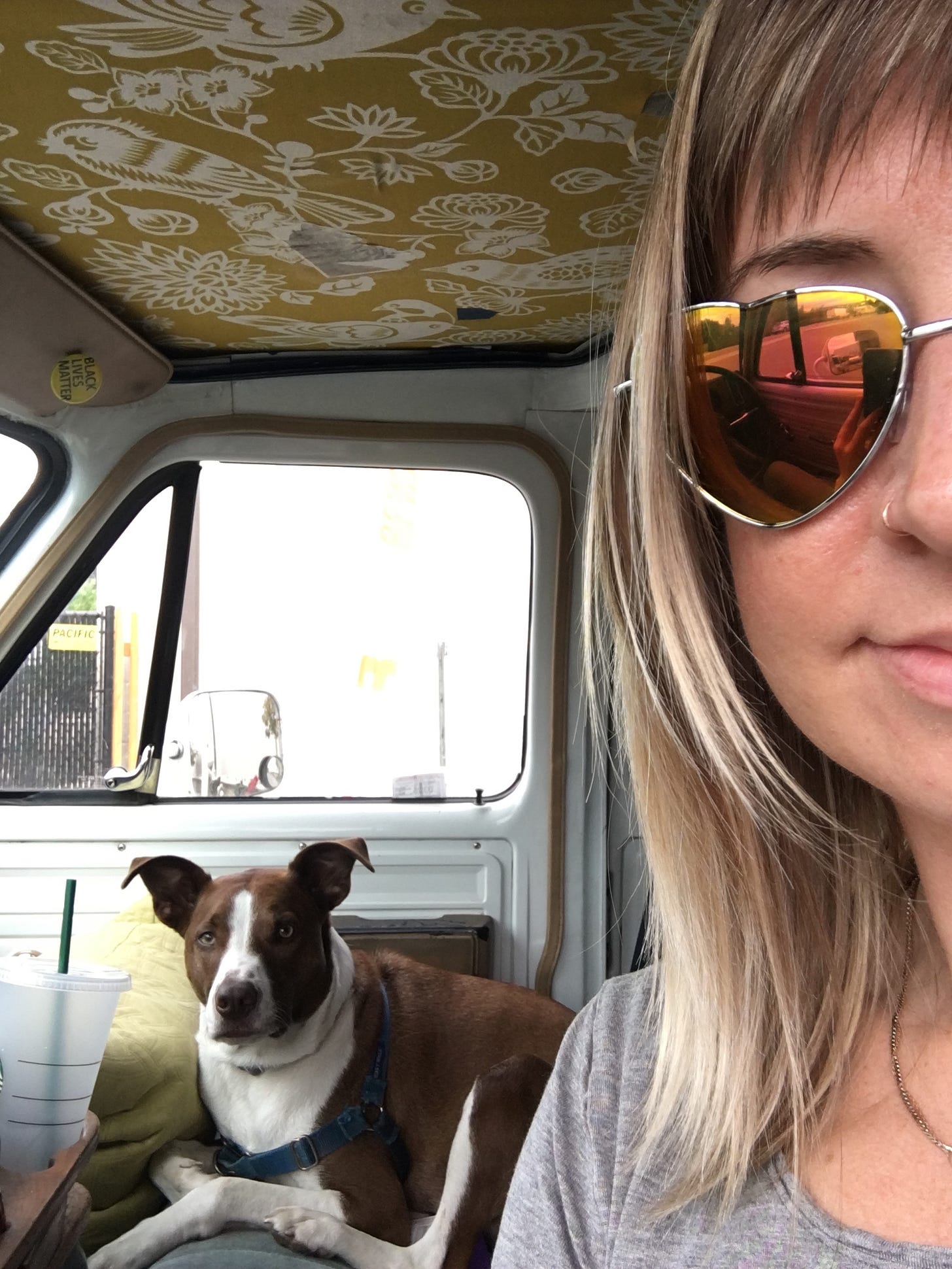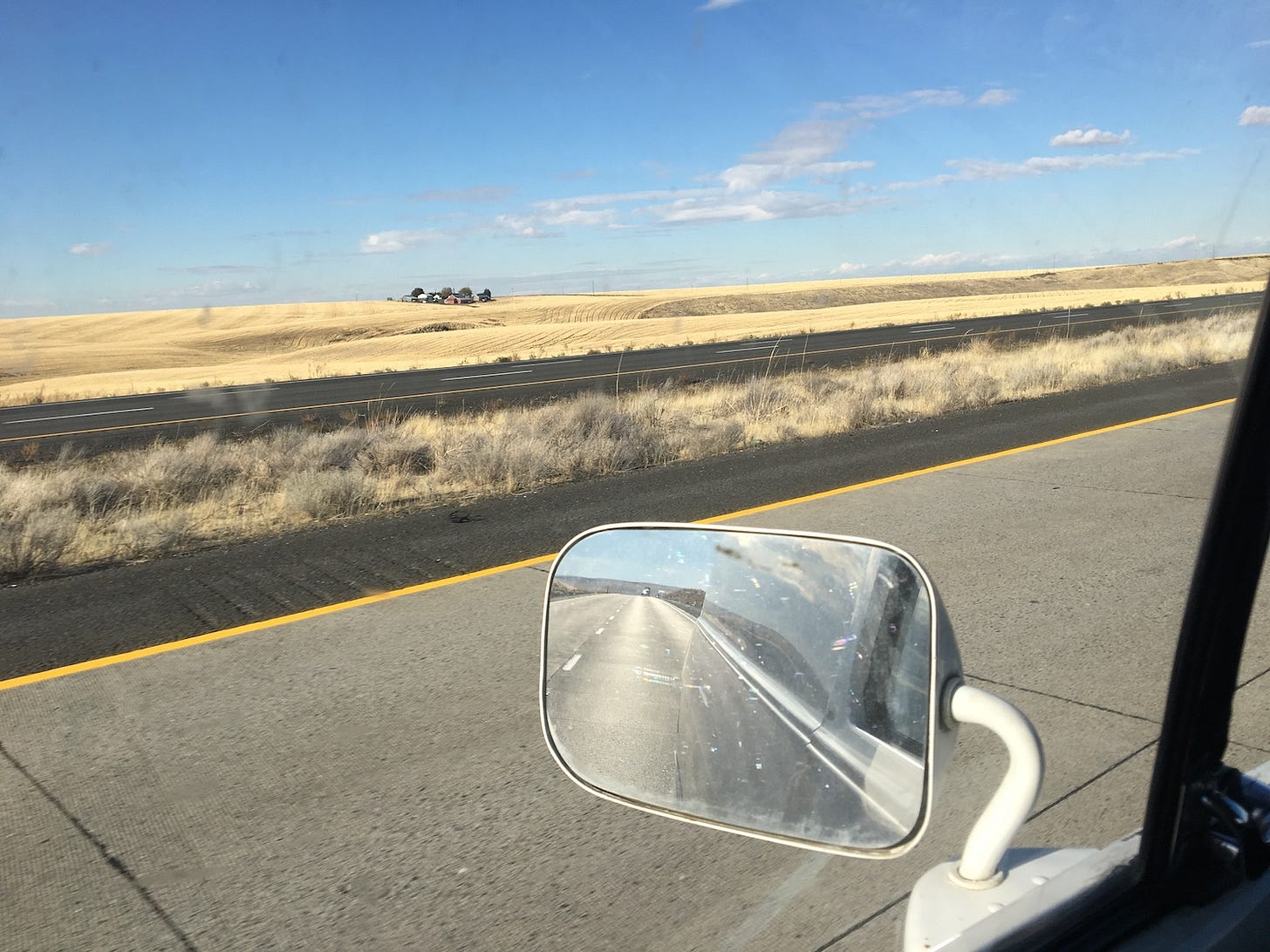I was sitting in the passenger seat when I saw her. My arm involuntarily shot across my husband’s chest to point out his window. “OH MY GOD!” I shouted.
His arms went lock-straight on the wheel. “WHAT?!” he shouted back.
(Sidenote: One should never shout OH MY GOD while sitting in the passenger seat unless the driver is about to hit something.)
I put my hand on his shoulder, realizing my lapse in judgment.
“I’m sorry! Oh geez. It’s just—it’s my van!”
Still vibrating with urgency, I again pointed out his window at a white GMC Vandura with a bright red bumper, parked a block away. Jacob, I’m sure, was still vibrating with fear. I apologized again for my poorly executed outburst. I was just SO excited to see her. My van!
Her name was Shirley, and she was a clattering hunk of metal with no heat, no air conditioning, no power-anything, and so much personality. She had a mustard-yellow floral fabric ceiling, and the back interior was painted night-sky blue with twinkle lights strung around a platform bed that could kind of fold into a couch but was better left alone. She broke down all the time. I probably spent as much time waiting for AAA to come tow me back to civilization as I did driving.
Of course, “my van” was not my van anymore. I sold it, years prior, to a guy who was going to live in it full-time. From the looks of it, Shirley hadn’t changed.
What has changed since my days with Shirley is absolutely everything about my life and my work.
Back when I first bought the van, travel was a big priority. Freelancing allowed me to do that. I bought the van so I could rent out my house, live on the road, and write. I had some vague plans for a book about road-tripping. Shortly after the purchase, however, I landed a full-time job at a tech startup in Portland. They did not allow remote work. It was an editing job with a salary that would make it a lot easier to afford my mortgage and maybe even pay down my student loans. Suddenly big plans for adventuring in the mountains and camping in the desert were put on hold.
Since I’d already started renting out my house as a vacation rental, I did periodically live in the van, parking on side streets around Portland instead of more scenic (and legal) locations for camping.
Back then, I often questioned my decision to take that job. Had I missed out on my chance to really live and work on the road? I wondered what I would have written if I hadn’t become a managing editor at a tech startup and instead spent those two years fully focused on a career in journalism, pitching and writing full-time. What would have happened if I’d stuck with journalism in that time when people thought the industry was in decline but ahem… it was actually pretty good compared to our current situation? I’d wonder, too, if that elusive book idea would be a real thing by now, fueled by all the inspiration I would have gathered along the nomadic path.
How many stories and bylines did I miss out on by staying put, by taking a salary to answer to an SEO-obsessed company trying to pull traffic from all the outdoor magazines that published the kind of articles I really wanted to be writing?
Then again, I did write a lot during that period of my life. In the early mornings, before reporting to the office, I’d work on essays and articles and I started building up a decent portfolio. The messy situation with the van and renting the house gave me plenty of inspiration. I wrote about how much I loved living alone in my house, even though I had to periodically sleep in a vehicle to afford my mortgage. I wrote about that time an ex-boyfriend called me, just as I was getting kicked out of a Wal-Mart parking lot that I thought allowed overnight visitors. I wrote about women living in small spaces more permanently than I was—and I met one of my best friends in researching that piece. I still traveled to plenty of cool places, like my favorite campground on the Oregon coast where I’d often go with my dog and write with the van doors open and rain plink-plinking on the hood.
It sounds kind of dreamy, but there was also a lot of financial and job stress and wondering-what-the-hell-I-was-doing-with-my-life stress. All of which become a part of my story—the paths not taken infusing the one I did take with more ambivalence and also more ideas.
Eventually, that path led me to sell the van, sell the house, buy a condo, meet my husband, become a mom, move cross country again. All those things. Who knows what I would have missed out on if I hadn’t taken the tech job, lived remotely for a few years, and really focused on my writing during that time? Who knows.
That’s the thing about writing as a profession—especially when you’re freelancing. There’s always something else you could be working on, another story idea, another grant or fellowship you could be applying to, a client you could be pitching, another version of the writing life you could be living.
All of our careers and our work are shaped by big and small decisions we’ve made along the way, people we’ve met, and opportunities we’ve come across. And all of those variations of being a working writer can stack up along a landscape of what-ifs. The freedom to compile different types of work into a career that reflects your interests and values is exciting—but also exhausting. And it’s hard not to look around and feel envious of other versions.
Not to mention the inevitable tangle of work and life as they become indistinguishable. Every work decision can be seen as a reflection of your values, your brand, your art—a reflection of you, even though it’s just your work. Every decision about what to write has the potential to feed into the image you have of yourself, and every decision you make about your life might influence what you might write about.
Was I a startup employee or a writer? It seems like a ridiculous question now. I’ve been so many other things since then. But a writer, always.
Moving to Connecticut has given rise to another line of what-ifs. What if my family and I had stayed in Portland, just as I was starting to pick up some momentum with this freelance thing yet again? What if I was still in the place where I knew the roots of so many stories, having amassed so much personal connection and knowledge about the landscape and culture and the environmental issues facing the area and all the travel trends and grand openings and new stuff to check out?
But here I am, working on this newsletter at the library in the Connecticut shoreline town I grew up in, 3,000 miles from the state that felt like home for a decade. When I’m done with this, I’ll write about that state because I still get a lot of Oregon-based work. And my mind will wander down those Oregon roads I know so well, and some that I only recently discovered on the trip I just took, and the distance will infuse the work with something new. What if I’d never known how much I would miss Oregon once I left? And how much I would love this new life, too?
I’m not going to run into Shirley anymore now that I don’t live in Portland. I hope her new owner is still rolling around town. I loved that van, but honestly, sleeping in the back of it doesn’t sound so great anymore. I was frequently stressed out about where to park overnight. These days, I really love a nice hotel room with wifi. I’ll still feel nostalgia and a little bit of the melancholy-what-ifs when I remember my time with good ‘ol Shirley. But as with every decision I’ve made since then, I remind myself to keep embracing the detours, roll down the windows, and write it all down.
Pitch me a travel essay!
I’m nearing the end of my big Oregon road trip. For the last two days, I’ve been in the Applegate Valley, a lush pocket of wineries and orchards tucked into the confluence of three mountain ranges in Southern Oregon. It’s only a dozen or so miles off I-5, the West Coast’s main artery of traffic and chain restaurants. But it feels like another world; the roads are quiet and swooping between rows of grapes and fruit trees. Thanks to a microclimate created by all these mountains, you’ll often find a skylight of sunshine here, even when clouds cover nearby towns.
That’s all for today, friends.
Stay inspired,
Britany









I lived in Florence, Oregon for 12 years before moving to New York to be closer to my husband's family. Oregon is where we had made our home - got married, had kids, I started my freelance career, etc. We moved mid-pandemic, so things were weird anyway, but I never realized just HOW MUCH I'd miss it. My life now is good, don't get me wrong, but I think back all the time and wonder many things, like yourself. What if... ??? Life is beautiful and tragic like that. Here's to making the best of where we are and forever looking back with a tender love (and even longing) - and here's to Oregon!
I love every bit of this thread, especially that on how often, and however you use to write back then!There is no greater joy than putting all the thoughts into words no matter the place and time! Also, I am a person who loves to live alone, and always enjoy the company of being myself, so I could very, very, very big resonate with your linked article about living in a room on your own. Yours is exactly the kind of story that I joined Substack for. I’m so happy to stumble upon you, Britany! 💛